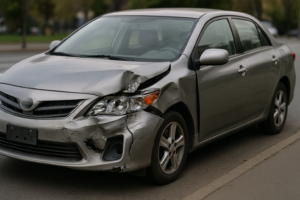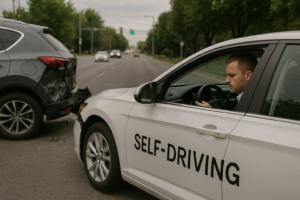DUI Fatality Crisis
Despite aggressive prevention efforts, DUI-related deaths remain a major public safety concern in Colorado. Understanding recent trends and statistics is crucial to shaping effective strategies and saving lives.
Were You or Someone You Know Injured?
Overview of DUI-Related Fatalities in Colorado
Year DUI Fatalities % of All Traffic Deaths
2022 286 37%
2023 218 30%
2024 203 (prelim.) 30%
width=”6.5in” height=”2.9166666666666665in”
2022 saw 286 impaired driving fatalities, accounting for approximately 37% of all traffic deaths in Colorado. This marked the highest number of DUI-related fatalities in recent years, likely influenced by post-pandemic behavioral changes and increased substance use. Key contributing factors included:
Polydrug use was significant, with 45% of drivers testing positive for multiple substances
The most common combination was alcohol and Delta-9 THC (the primary psychoactive component of cannabis)
Cannabis-involved crashes increased 51% from 2021 to 2022
Adams County had the highest number of fatalities involving an impaired driver at 35, followed by El Paso and Denver at 21 each
In 2023, fatalities decreased to 218, a significant 23.8% drop from the previous year. These deaths represented 30% of total traffic fatalities, reflecting the impact of targeted enforcement campaigns and public awareness initiatives. CDOT awarded more than $10 million in funds from the National Highway Traffic Safety Administration to local partners for awareness efforts and law enforcement campaigns.
Preliminary data for 2024 indicates 203 fatalities, showing an 11% decrease from 2023. This promising trend marks the lowest number of DUI fatalities since 2019, suggesting continued progress in prevention efforts. The counties with the highest number of deaths involving an impaired driver in 2024 were El Paso (26), Adams (25), Weld (24) and Denver (18).
Weekend nights between 10 PM and 2 AM continue to see the highest concentration of DUI fatalities. During these high-risk hours, nearly 65% of all fatal crashes involve at least one driver impaired by alcohol or drugs.
Individuals aged 25 to 34 had the highest number of DUI arrests in 2023. This demographic represents a disproportionate share of both DUI arrests and fatalities, highlighting a critical target for intervention strategies.
Males constituted approximately 75% of DUI arrests in 2023. This significant gender disparity has remained consistent over recent years, indicating the need for targeted education and prevention efforts.
The Science of Impaired Driving
- Impaired driving fundamentally changes how you operate a vehicle. Your reaction time slows significantly, and your peripheral vision becomes reduced, creating dangerous conditions that put everyone on the road at risk.
- A drunk driver is 11 times more likely to be involved in a fatal crash than a sober driver. While marijuana impairment also affects driving ability, studies show that alcohol poses a significantly greater risk to public safety, with marijuana users approximately twice as likely to crash compared to sober drivers.
Even at BAC levels below 0.08%, driving ability becomes compromised. In Colorado, drivers with BAC between 0.05% and 0.08% can be charged with Driving While Ability Impaired (DWAI), which carries serious penalties.
Colorado's Most Impacted Counties
Adams County reported the highest fatality rate with 81 deaths from drunk driving crashes. This county also had the most drivers (113) involved in fatal crashes related to alcohol impairment.
Arapahoe County followed with 62 fatalities and 86 drivers involved in fatal DUI crashes. These statistics highlight areas where targeted enforcement and education could have significant impact.
Weld County had 53 fatalities and 68 drivers involved in fatal drunk driving incidents. Boulder County reported 34 deaths and 54 drivers, completing the list of counties most severely affected by impaired driving.
Statewide Prevention Campaigns
“Shift into Safe” is CDOT’s comprehensive traffic safety brand encouraging conscious decisions behind the wheel. This cross-platform, multimedia campaign is driven by science and inspired by Colorado’s unique driving challenges.
“No One is Above the Laws of Physics” uses scientific experiments to demonstrate how impairment affects drivers. This campaign features testimonials from medical professionals and families who have lost loved ones to impaired driving crashes.
“The Heat Is On” provides funding for enhanced law enforcement during high-risk periods. This initiative includes 16 specific high-visibility enforcement periods throughout the year, focusing on holidays and large public events. In 2025, CDOT is conducting 21 days of back-to-back DUI enforcement which began February 6 with Super Bowl weekend and continues through Presidents Week.
New distracted driving law enforcement began in 2025. A new law went into effect on January 1, 2025 that prohibits drivers from using mobile electronic devices while driving (though hands-free accessories are permitted), addressing another significant factor in traffic fatalities.
Were You or Someone You Know Injured?
Legal Consequences of Impaired Driving
- Colorado recognizes multiple alcohol-related driving offenses with different thresholds. DUI applies when blood alcohol content reaches 0.08% or higher (0.04% for commercial drivers), while DWAI applies with BAC between 0.05% and 0.08%, and drivers under 21 can be penalized for any BAC over 0.02% under Colorado’s Zero Tolerance law.
- Vehicular homicide involving DUI is classified as a Class 3 felony in Colorado under C.R.S. § 18-3-106. This serious charge carries potential prison sentences of 4-12 years and fines up to $750,000 for those convicted.
Conviction results in mandatory revocation of driving privileges for at least 1 year. Repeat offenders face increasingly severe penalties, including mandatory installation of ignition interlock devices.
Support and Legal Recourse
- Victims and families affected by DUI-related crashes have the right to seek compensation. The legal system provides avenues for pursuing justice and financial recovery for medical expenses, lost wages, and pain and suffering.
- Specialized legal representation is essential when navigating DUI-related accidents. These complex cases require knowledge of both criminal proceedings and personal injury law to ensure proper representation.
Free, confidential consultations are available to discuss your specific situation. Our experienced attorneys can explain your rights and help create an effective legal strategy.
(FAQ) Frequently Asked Questions
What measures are being taken to reduce DUI incidents in Colorado?
The state has implemented targeted enforcement campaigns like “The Heat Is On,” public education initiatives such as “Shift into Safe,” and technological advancements to detect and deter impaired driving. These coordinated efforts have contributed to the declining fatality rates observed from 2022 through 2024, as verified by the CDOT Crash Data Portal.
How can individuals contribute to preventing DUI-related fatalities?
By choosing not to drive under the influence, using alternative transportation options like rideshares, designated drivers, or public transportation. Always plan a safe ride home before drinking, and encourage others to do the same. Together, we can save lives and keep Colorado safe.
What is the legal BAC limit in Colorado?
The legal limit is 0.08% for drivers 21 and older. However, drivers can be charged with DWAI (Driving While Ability Impaired) with a BAC as low as 0.05%. Commercial drivers face a stricter 0.04% limit, and under Colorado’s Zero Tolerance law, drivers under 21 can be penalized for any BAC over 0.02%.
What are the penalties for first-time DUI in Colorado?
First-time DUI offenders face 5 days to 1 year in jail, fines of $600-$1,000, up to 96 hours of public service, and license suspension. When a death is involved, these penalties increase dramatically to felony charges with potential years of imprisonment under C.R.S. § 18-3-106.
Where can I find support if affected by a DUI incident?
Resources are available through the Colorado Department of Transportation, local victim advocacy groups, and specialized legal services. Support includes counseling, guidance through the legal process, and assistance with insurance claims.
Contact ramos law
Impaired driving costs Colorado lives. One out of every three traffic deaths in Colorado involves an impaired driver. Get a safe ride home. Shift into safe.


